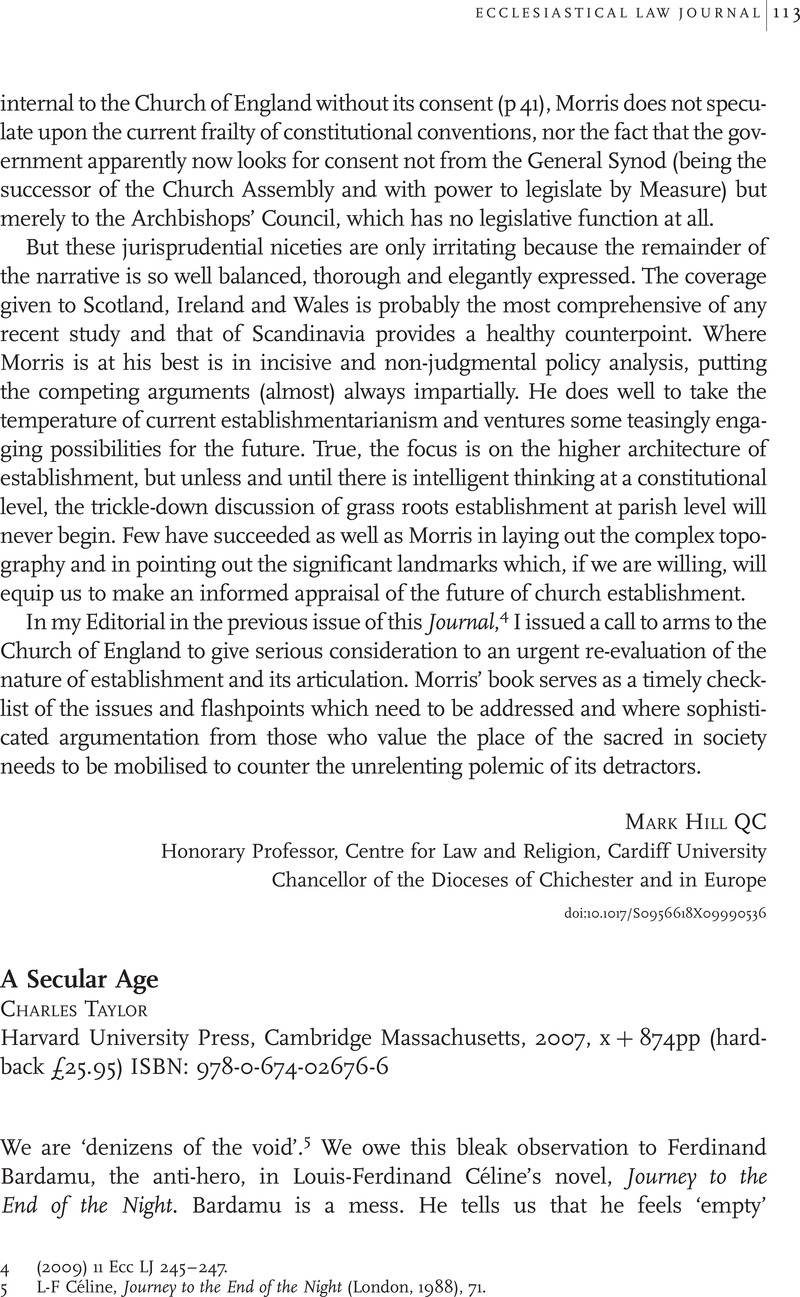No CrossRef data available.
Article contents
A Secular AgeCharles Taylor Harvard University Press, Cambridge Massachusetts, 2007, x + 874pp (hardback £25.95) ISBN: 978-0-674-02676-6
Published online by Cambridge University Press: 05 January 2010
Abstract

- Type
- Book Reviews
- Information
- Copyright
- Copyright © Ecclesiastical Law Society 2010
References
5 Céline, L-F, Journey to the End of the Night (London, 1988), 71Google Scholar.
6 Ibid, 265.
7 Ibid, 265 and 313.
8 Ibid, 319.
9 Taylor, C, Sources of the Self: the making of modern identity (Cambridge, 1989)Google Scholar.
10 Macedo, S, Liberal Virtues: citizenship, virtue, and community in liberal constitutionalism (Oxford, 1991), 67Google Scholar.
11 Rawls, J, Political Liberalism (New York, 1993), xviiiGoogle Scholar. (While political liberalism commits those who embrace it to fashioning a secular state, this state cannot sponsor ‘secularism’. For that would be to breach political liberalism's commitment to the principle that the state is neutral as between comprehensive doctrines: ie, conceptions of the good (of which secularism is an example). I am grateful to Cécile Laborde for alerting me to this point. (We might contrast this political liberalism with ‘the militant and essentially illiberal antireligionism’ that Hayek associates with the French Revolution. See Hayek, FA, The Constitution of Liberty (Abingdon, 2006), 351Google Scholar.))
12 See also Taylor, C, Hegel (Cambridge, 1975), 541CrossRefGoogle Scholar.
13 See Sartre, J-P, Nausea (London, 1962), 171Google Scholar (where the author captures nausea thus: ‘[i]f anyone had asked what existence was, I should have replied in all good faith that it wasn't anything’).
14 Cf Oakeshott, M, Experience and its Modes (Cambridge, 1933), 295CrossRefGoogle Scholar (emphasis added) (arguing that ‘[r]eligion differs from other forms of practical activity, not in kind, but in degree; it is characterised everywhere by intensity and strength of devotion and by singleness of purpose’).
15 While ‘fragility of meaning’ is, on Taylor's analysis, a problem that is growing more acute (due to the ‘nova effect’ he describes), some explain it by reference to other (and sometimes highly specific) causes. For example, Richard Overy has recently noted the way in which the Great War (1914–1918) undercut (for many who endured it) the ‘pre-war assumption that civilisation was permanent and progressive’. This, he argues, caused many to experience an ‘undifferentiated sense of malaise’. See Overy, R, The Morbid Age: Britain between the Wars (London, 2009), 36Google Scholar. See also 13 (discussing the views of John Beevers and Cyril Joad).
16 See also C Taylor, Hegel, 543–544 (on, inter alia, Friedrich Nietzsche's notion of ‘pitiable comfort’ (ërbarmliches Behagen)).
17 Klug, F, Values for a Godless Age: the story of the United Kingdom's new Bill of Rights (London, 2000)Google Scholar, 201 et seq.
18 Ellis, B Easton, Rules of Attraction (London, 1987)Google Scholar, 18 and 20.
19 Ibid, 76, 84 and 101.
20 Ellis, B Easton, Less Than Zero (London, 1985)Google Scholar, 114 and 205.
21 So too are those offered in Coupland, D, Life After God (London, 1994)Google Scholar, 177–178, 273, 345 and 359, and Coupland, D, Girlfriend in a Coma (London, 1998)Google Scholar, 59,and 124, 154 and 281.
22 Scruton, R, Modern Philosophy: a survey (London, 1994)Google Scholar, 458 (quoting Jean-Paul Sartre and drawing on Martin Heidegger who argued that nothing ‘noths’ (Das Nichts nichtet)). While we cannot pursue the point in detail here, we might see a transfiguring religion as one response to ‘nothing’ and its malign effects (as described by Heidegger). See Overy, The Morbid Age, 40 (noting that Arnold Toynbee took such a view when he stated that Christianity enables its adherents to overcome a ‘schism in the soul’ arising from loss of spiritual certainty).


